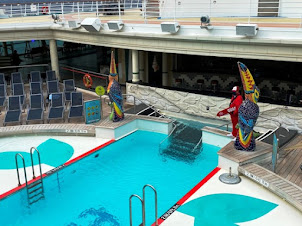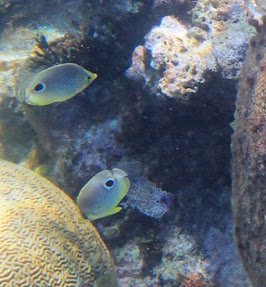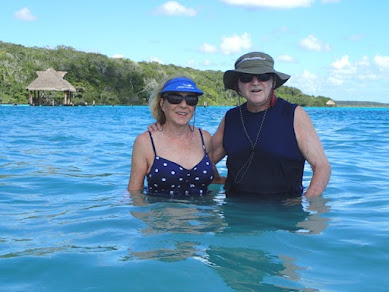 |
| Ultimately we decided to cruise |
It was a dilemma between making what appeared to be the sensible choice and staying home or escaping the box we had been huddled in for almost two years. My brain had one solution, but my spirit had another. And that’s why Larry and I went on a cruise in early 2022, just as the omicron virus swept our state and county into the worst scenario since the pandemic began almost 2 years ago.
We had traveled during 2021, visiting Big Bend
National Park in Texas in April and Fort Lauderdale, Florida in March. We
celebrated our grandson’s high school graduation in Michigan in May. By July
the virus had loosened its grip on our lives, and travel seemed okay again. So
in August we swam with whale sharks off the Yucatan peninsula of Mexico and
finally took the trip to Italy that had been rescheduled three times. We even
visited Colorado for a glorious week hiking among the golden aspens of autumn.
And all went well.
A previous Caribbean cruise was already booked for
mid January, but the delta virus became a headliner, so we cancelled. Felt like
that was the smart (safe) thing to do, and it was. But wanderlust crept into my
consciousness, and by November I was ready to try again—just on a smaller
scale.
 |
| Inviting pool area of the ship |
Instead of flying to a Florida port for a 12-day
cruise, maybe we could sail from Galveston, our state’s home port only a 3.5
hour drive away for a quick one-week excursion. We had received our two
vaccines and would soon receive the booster shot, so, together with distancing
and masking, we’d have ample protection. A cruise leaving on January 2 was
booked.
Then omicron began spreading faster than milk
spilled on the kitchen table. Friends on a long holiday cruise texted about not
being able to disembark at most ports. They were stuck on the ship for weeks
(at least it seemed that long) with not much to do except watch waves curl and
splash in the ocean. The CDC began issuing dire warnings about ships with 10 or
20 or 50 people on board who tested positive for covid (not considering it was
usually less than one percent of the number of people on board and most had
very mild or no symptoms).
Still, being quarantined at sea in a small cabin
would not be fun. Nothing adventurous about that.
One week before sailing we considered cancelling.
Because our cruise line was allowing passengers to cancel up to 48 hours before
sailing in return for full future cruise credit, people began doing just that.
For a few days, we had a new argument for going. With only about half the passengers still booked, social distancing would be easier, and service would likely be much improved. We began to reverse our decision. Call it rationalization or an actual shift in the likelihood of getting sick, we latched onto that fact. Also, all passengers and crew were required to be fully immunized, and we had to present a negative covid test taken two days before sailing.
The usual excitement was missing as we packed for
the cruise. There were still so many unknowns, but we were willing to do our
part to make this as personally safe as possible. That commitment and
willingness to be extra vigilant on the cruise served us well.
Sailing day was uncharacteristically cold and windy
as we drove to Galveston, Texas. Bundled in sweaters and puffy jackets, we parked
the car, took the shuttle to the dock, and boarded the Royal Caribbean Liberty
of the Seas. Fully vaccinated passengers were provided green wrist bands to be
worn at all times. This would allow them access to certain dining areas,
theater seating, and venues designated for vaccinated persons.
 |
| Fish and coral from our snorkeling excursion at Roatan, Honduras |
Because of predicted inclement weather, the captain
changed the order of ports and headed to our southernmost stop in Roatan,
Honduras. From there we would follow a northward journey that included Costa
Maya and Cozumel. This new itinerary meant we had two sea days before docking--a
brilliant decision that ultimately allowed passengers to have three perfect
days for land activities. Winter in the Caribbean did not disappoint!
We were careful about our activities. We
masked up indoors and also outdoors if there was a crowd of people around. We
requested, and were given, a table for two in an out-of-the- way location but
still by a window—the same table every evening in the main dining room.
We walked the promenade decks for additional
exercise on sea days, played mini golf or ping pong when those venues were not
crowded, and enjoyed our balcony when the weather warmed. We danced to our
favorite band several nights and enjoyed a couple of game shows in vaccinated-only
venues.
 |
| We rafted to a beautiful lagoon near Costa Maya, Mexico |
We managed to catch the ice show before it was
cancelled due to cast members quarantining (our green bracelets were checked).
One main show in the theater was also cancelled, but the evening I forgot my
green bracelet I was denied entry to the vaccinated seating section until I
went back to the cabin to retrieve it. Tours were also lightly attended, with
one of ours having only nine people and another only four.
Yet omicron continues to affect the cruising industry. Royal Caribbean and other cruise lines have cancelled many U.S. departures into March. As for Royal Caribbean, since the resumption of sailing, the total percentage of persons to become ill with the virus onboard their ships is 1.6, much lower than the general population in many areas. Crew members cannot leave the ship when in port, and some have had contracts extended longer than originally intended to shore up staff numbers. Senior officers became dining room servers when needed. Safety and service were still primary, and I give the cruise industry credit for doing the best they can.
 |
| We explored the ocean via a helmet dive at Cozumel, Mexico |
Whether you decide to cruise in the coming months
(assuming your cruise is not cancelled) is a personal choice. It’s a decision
that only you can make by taking into consideration your medical situation and
your tolerance for risk. Even as we know that all travel is inherently risky,
we also know there are many benefits to exploring the rest of the world.

No comments:
Post a Comment